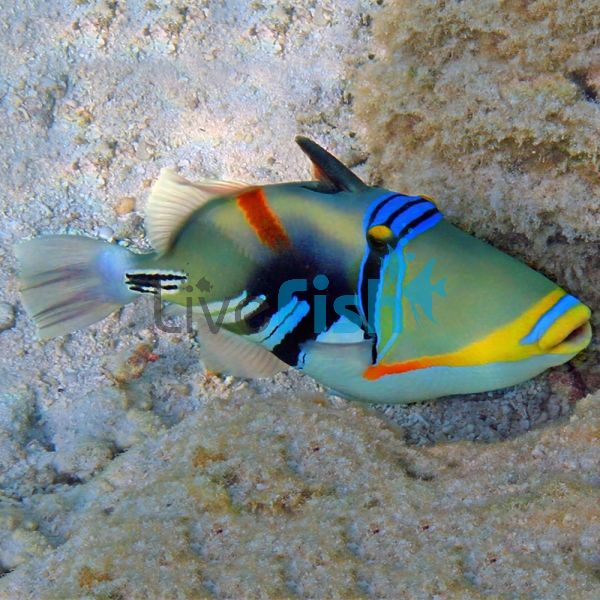Picasso Triggerfish - Medium
The Picasso Triggerfish has a mainly white body with various splotches of colour giving it a painted appearance from which it gets its artist's name. Their markings range in colours including neon blue, yellowish-orange and shades of black. They can grow up to 30 cm making them a very impressive addition to any suitable tank.
Picasso Triggerfish
The Picasso Triggerfish has a mainly white body with various splotches of colour giving it a painted appearance from which it gets its artist's name. Their markings range in colours including neon blue, yellowish-orange and shades of black. They can grow up to 30 cm making them a very impressive addition to any suitable tank.
There are no notable differences between the sexes and so far breeding has been unsuccessful in captivity.
These fish have a lot of character and have been known to eat out of their owner's hand when still juveniles. Be careful though as they have plenty of sharp teeth and can leave a nasty bite. When startled Picasso Triggerfish will make a strange machine-like whirring sound which can sometimes warn you before they will snap.
This species is originally found all over the Indo-Pacific region from South Africa and the Red Sea over to Japan and even as far across as the Hawaiian Islands. They love protected lagoons and reef flats and normally swim around openly.
Tank Recommendations for Picasso Triggerfish
The smallest tank size required for this species is 290 litres as they can grow quite large. Give them plenty of live rock to provide hiding spaces but be aware that they love to move things around so expensive coral structures are a no-go. No special lighting or water movement requirements are needed. Also, note that these fish seem to show less aggression when provided with a tank that is larger than the smallest recommended.
Suitable Tank Buddies
Although the Picasso Triggerfish is one of the more easy-going triggers they can still cause havoc around smaller tank buddies and invertebrates/crustaceans. Keep them with more aggressive larger fish.
Usually Compatible
Triggerfish can be highly temperamental creatures and may get territorial with almost any other species. For this reason, we don't recommend any 'best fit' species that they can be combined with as the size of your tank will dramatically affect your triggerfish's behaviour.
Sometime Compatible
Some species that could combine well if chosen carefully include Angelfish, Blennies and Boxfish. Clownfish, Butterflyfish and Damselfish should be picked with caution as well. Other possible tank buddies can include Goatfish, Gobies and Hawkfish. Lionfish, Parrotfish and Pufferfish should have a close eye kept on them too. Be careful when attempting to combine them with Tangs, Wrasses and other Triggerfish as well.
Rarely Compatible
Avoid Frogfish, Batfish and Cardinalfish at all costs. Crustaceans and invertebrates will more than likely get eaten. Filefish, Dragonets and Rays shouldn't even be considered either. Sharks will likely see your Triggerfish as prey too. Delicate species such as Pipefish and Seahorses should also not be added to a tank containing this species of Triggerfish.
Feeding your Picasso Triggerfish
This species is primarily carnivorous in the wild but will do well on an omnivorous diet in captivity as long as enough meat is provided. Provide them with fresh meaty foods such as squid, shrimp and cut up fish. They can be trained onto frozen foods with ease as long as it is highly varied. Supplement their diet with marine algae if there aren't enough algae to graze available on the live rock in your tank.
| Scientific Name | Rhinecanthus Aculeatus |
|---|---|
| Care Level | Moderate |
| Common Names | The Picasso Triggerfish is also known as the Whitebanded Triggerfish, the Huma Huma and the Painted Triggerfish. |
| Diet | Omnivore |
| Fish Family | Balistidae |
| Lifespan (years) | 8 |
| Max. Length (cm) | 26 |
| Min. Tank Volume (l) | 290 |
| Origin | Indo-Pacific |
| Reef Safe | No |
| Sociability | Peaceful |
| Venomous | No |
| Water Conditions | 24 - 28° C, dKH 8-12, pH 8.1-8.4, sg 1.021-1.025 |



